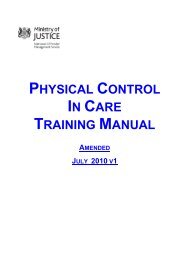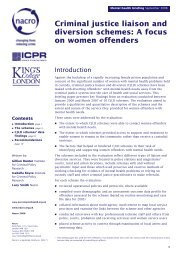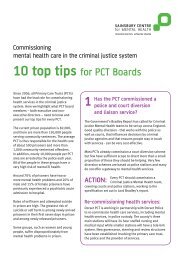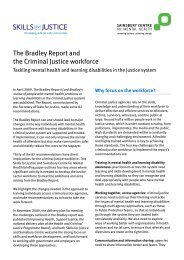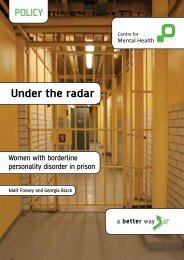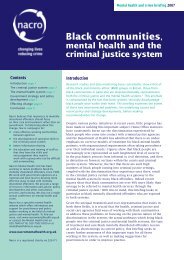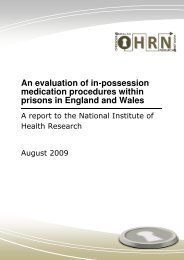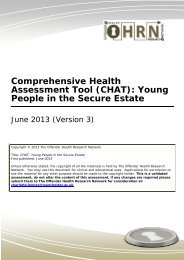Engendering Justice - from Policy to Practice - The Fawcett Society
Engendering Justice - from Policy to Practice - The Fawcett Society
Engendering Justice - from Policy to Practice - The Fawcett Society
- No tags were found...
Create successful ePaper yourself
Turn your PDF publications into a flip-book with our unique Google optimized e-Paper software.
equirement could be used <strong>to</strong> refer women <strong>to</strong> voluntarysec<strong>to</strong>r organisations for specified programmes orrequirements can be used <strong>to</strong> ensure women receive drugor mental health treatment. However, it was reported <strong>to</strong>the Commission that, at least in some areas, magistratesare advised against using a wider range of orders due <strong>to</strong>the management burden this would place on probation.<strong>The</strong>re is a need for further investigation on how communitysentences could be utilised more effectively for women andmagistrates should be consulted as part of this.Community sentencing and other alternatives <strong>to</strong> cus<strong>to</strong>dywill also only be effective if sentencers see these alternativesas viable options which will rehabilitate women offenders.Organised visits <strong>to</strong> community provision for women wouldenable sentencers <strong>to</strong> gain awareness on the communityprovision available and the benefits of non-cus<strong>to</strong>dialapproaches for female offenders. Community organisationscan also be approached <strong>to</strong> take part in training sessionsand this appears <strong>to</strong> be starting <strong>to</strong> happen but as Anawim,a voluntary organisation in Birmingham working with femaleoffenders, <strong>to</strong>ld the Commission, this is hard work: “<strong>The</strong>reare 350 Magistrates in Birmingham and getting around all ofthem is nearly impossible, but we are booked <strong>to</strong> take part intheir training in Oc<strong>to</strong>ber.” 40<strong>The</strong> Commission is also concerned, given the key rolethat legal advisers play in advising on sentencing optionsthat training is provided <strong>to</strong> these advisers. <strong>The</strong> MagisterialCommittee of the Judicial Studies Board has recentlycirculated the Cors<strong>to</strong>n Report <strong>to</strong> all legal advisers and itwill be made available <strong>to</strong> all Magistrates. <strong>The</strong> new wingerworkbooks for magistrates also include sections onfemale offenders and victims. It is vital <strong>to</strong> ensure that thisinformation is put in<strong>to</strong> practice on a daily basis within thecourtroom.<strong>The</strong> Law in relation <strong>to</strong> Previous Convictions andBreach of Court OrdersEvidence presented <strong>to</strong> the Commission highlighted thatwomen are disproportionately affected by the current law inrelation <strong>to</strong> previous convictions and breach of court orders.<strong>The</strong> Criminal <strong>Justice</strong> Act 2003 requires previous offences<strong>to</strong> be taken in<strong>to</strong> account in deciding the seriousness ofthe current offence. This change in the law has meant thatwomen committing repeat shoplifting or low-level fraudoffences are likely <strong>to</strong> be treated more harshly by sentencers,as their previous offences will increase the severity oftheir present offence. As a result, this has the potential<strong>to</strong> increase the likelihood of women receiving a cus<strong>to</strong>dialsentence. Further breaches of court orders also have thepotential <strong>to</strong> disproportionately increase the likelihood offemale offenders receiving a cus<strong>to</strong>dial sentence.As recommended in the Cors<strong>to</strong>n Report, the Commissionreiterates that the restrictions placed on sentencersfor breaches of community orders should be mademore flexible as a matter of urgency. This would allowsentencers <strong>to</strong> draw a distinction between serious breachand unavoidable breaches such as a failure <strong>to</strong> keep anappointment due <strong>to</strong> childcare responsibilities. In turn, therate of breach should reduce if community sentencesare tailored <strong>to</strong> take in<strong>to</strong> account women’s domesticresponsibilities and vulnerabilities.Over-use of RemandIn this country it’s ‘innocent until proven guilty’, but yetyou are still remanded in cus<strong>to</strong>dy. I’ve served 5 and halfmonths so far. If I get released by court I would havespent all that time away <strong>from</strong> my children for nothing. 41In February 2009, there were 782 adult females onremand, 42 almost one in five of the female prison population.Only half of all remanded prisoners go on <strong>to</strong> receive a prisonsentence. In 2005, only 41 percent of women on remandreceived an immediate cus<strong>to</strong>dial sentence. 43 Notably, somesentences are ultimately non-cus<strong>to</strong>dial because of timespent on remand. As Table One demonstrates, the numberof females being remanded in<strong>to</strong> cus<strong>to</strong>dy has continued <strong>to</strong>increase. <strong>The</strong> Commission has consistently voiced concernat the number of women being held on remand and urgesthe Government <strong>to</strong> ensure that adequate and robustalternatives <strong>to</strong> remand are available <strong>to</strong> the judiciary, suchas single-sex bail hostel provision which is appropriate forwomen with and without caring responsibilities, intensivesupervision, electronic surveillance and transportation <strong>to</strong>court.Page 29



